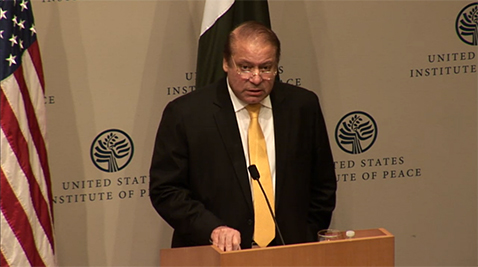WASHINGTON — Pakistani Prime Minister Nawaz Sharif said Friday that U.S. cooperation was important to his counter-terrorism initiatives to restore peace in Pakistan and neighboring Afghanistan in the face of mounting challenges from the Taliban.
Sharif, 65, was in the United States for his second visit to participate in bilateral talks and addressed an audience at the United States Institute of Peace.
He met with President Barack Obama Thursday to talk about the future of U.S.-Pakistan ties where they “reaffirmed their commitment to address evolving threats in South Asia,” according to a White House statement.
Sharif told the institute audience he wanted to “reinforce our important relationship.”
“Our extensive cooperation on counter-terrorism can be intensified and improved especially by promoting mutual trust and confidence,” the Pakistani leader said.
Stephen J. Hadley, chairman of the institute’s board of directors, said that the second round of talks between the Afghan government and Taliban scheduled to be held earlier this year at Murree in Pakistan was canceled by the announcement that Taliban’s first leader Mullah Omar had died two years earlier.
Speaking of the challenges posed by the Afghan Taliban and its attacks on the Pakistan and Afghanistan governments, Sharif said that it was better to achieve peace through negotiations rather than use military solutions to fight insurgents.
“We are prepared to assist in reviving the talks between Kabul and Afghan Taliban but we cannot bring them to the table and be asked to kill them at the same time,” Sharif said, referring to the insurgents breaking off talks and reverting to violence after Omar’s death.
Sharif insisted that the final phase of Zarb-e-Azb, a military operation launched in June last year to fight militant groups including the Taliban, would wipe out the few remaining terrorist hideouts in the country.
He sought international cooperation to install civil nuclear power plants under the safeguards of the International Atomic Energy Agency and said it would benefit Pakistan to become a member of Nuclear Suppliers Group, a body created to ensure that nuclear materials in civilian trade are not put to military use.
Sharif also lauded the “Let Girls Learn” initiative launched by First Lady Michelle Obama to expand the education of adolescent girls in Pakistan.
Sharif lamented on the lack of cooperation from India over its relations with Pakistan and said that the government of Indian Prime Minister Narendra Modi has been giving ‘flimsy excuses” to scuttle high-level meetings.
Addressing the relationship between India and Pakistan was the most difficult and urgent challenge for his government, Sharif said.
He called India’s major arms build-up “regrettable” and said that “this will compel Pakistan to take several countermeasures.” He was not specific.
Less than a minute into his speech at the institute, Sharif was interrupted by a protester who shouted slogans calling him a friend of the late Al Qaeda leader, Osama bin Laden.
Roughly 45 seconds into the prime minister’s remarks, the protester shouted “Free free Balochistan,” “You are bin Laden’s friend” and “Stop the war crimes in Balochistan.” He was escorted out by security personnel.

